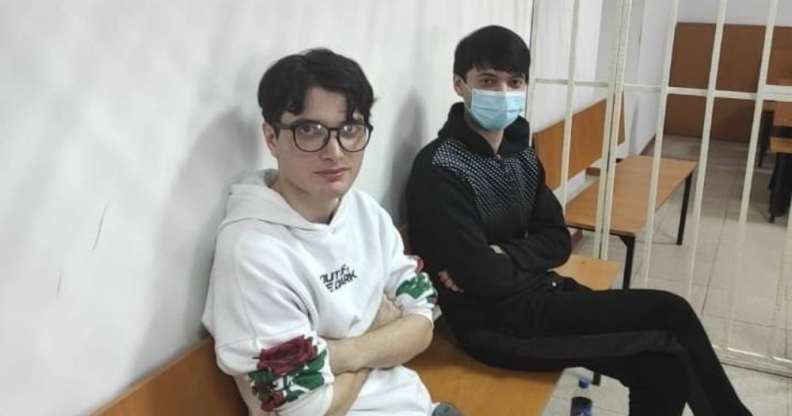Chechnya jails queer siblings on ‘fabricated’ charges after years of persecution and torture

Salek Magamadov and Ismail Isayev. (Crisis Group)
A court in Chechnya has sentenced a pair of LGBT+ siblings to almost a decade’s detainment on seemingly bogus charges.
On Tuesday (22 February), the Achkhoy-Martan district court of the southern Russian republic convicted siblings Salekh Magamadov, 21, and Ismail Isayev, 19, for “complicity with illegal armed formations by providing products”.
Magamadov received an eight year sentence (one in prison and seven in a strict-regime colony) and Isayev was sentenced to six years in a common-regime colony, Crisis Group NC SOS confirmed Tuesday (22 February).
Chechen investigators allege that the siblings smuggled “groceries” to alleged militant Rustam Borchashvili.
The siblings pleaded not guilty, and, according to Crisis Group NC SOS, believe the case against them was fabricated because of their sexual orientation and political views. One is gay, the other trans, according to Amnesty.
In 2019, a police officer detained Isayev for 10 days after finding an LGBT+ Pride flag on their mobile phone, thrusting them onto law enforcement’s radar.
The authorities abducted Isayev again when they were just 16, in April 2020. Isayev and Magamadov had been moderating the youth-led Telegram channel Osal Nakh 95 that was critical of the Chechen leadership.
After being tortured, Isayev was made to “apologise” on camera for their involvement in the channel.
In July 2020, the Russian LGBT Network provided Magamadov and Isayev with a flat in the city of Nizhny Novgorod with plans to apply for asylum in another country. Officers abducted the siblings from their home and forcefully transported them back to Chechnya in February 2021.
Much of the prosecution was based on two so-called “confessions” that the siblings were forced to write out by investigators during “two months of hell” in detainment, which said that they handed products to Borchashvili in June 2020.
Borchashvili was later killed by security forces in October 2020 as part of a counterterrorist operation.
Their lawyers have stressed that there is no objective proof of either being guilty and that the judicial process has been shot with “inconsistent, contradictory testimony of the prosecution witnesses”.
“Today’s verdict of the Chechen court is a crime against common sense,” Miron Rozanov of Crisis Group NC SOS said.
“Salekh Magamadov and Ismail Isaev are innocent. Their case is completely fabricated.”
“Salekh and Ismail are prisoners of conscience,” he added. “Incredibly resilient and courageous, they are innocent and should be released immediately.”
Amnesty International’s Eastern Europe and Central Asia director Marie Struthers added: “Salekh Magamadov and Ismail Isaev must be immediately and unconditionally released.”
“They should never have been charged in the first place. Belonging to the LGBTI community in Chechnya — or anywhere else for that matter — is not a crime.
“Nobody should be detained for their sexual orientation or gender identity or for criticising the authorities,” Struthers added.
“Their ordeal must end now.”
Chechnya’s ‘gay purge’
Countless activists, journalists and survivors have accused Chechen security forces of arresting, torturing and killing LGBT+ people.
In 2017, the newspaper Novaya Gazeta reported that more than 100 gay men had been detained and said at least three had died in extrajudicial killings.
Police tortured the men with electrical shocks and starvation, demanding that they disclose the names of their partners and LGBT+ community leaders, survivors told the Human Rights Watch. Family members of the detained were often tortured and pressured as well.
When pressed on the so-called “gay purge”, a spokesperson for Chechnya’s leader, Ramzan Kadyrov, told Novaya Gazeta: “You cannot arrest or repress people who just don’t exist in the republic.
“If such people existed in Chechnya, law enforcement would not have to worry about them, as their own relatives would have sent them to where they could never return.”
The crackdown effort was renewed in 2019. The Russian LGBT Network said in a report that at least two people were killed and around 40 men and women confined in a makeshift prison cell. Once again, while Chechen police carried out the mass roundup, they faced little repercussions from the federal authorities.
Officers began the second wave of incarcerations by bringing in the moderator of an online chatroom for queer people.

Russia’s Prime Minister Mikhail Mishustin (L) and Ramzan Kadyrov, head of the Chechen Republic, during a meeting. (Dmitry AstakhovTASS via Getty Images)
The Russian LGBT Network said at the time that it had helped more than 140 Chechen LGBT+ people to flee to other European countries and Canada. Those who stay, much like Magamadov and Isayev, often face time behind bars for bogus charges.
According to the Centre for Eastern Studies, strict regime colonies see inmates’ lives deeply restricted. Prisoners live in overcrowded cells shared with 20 to 50 others.
Common penal colonies are still heavily supervised, with inmates living in large barracks that they cannot move freely around.

